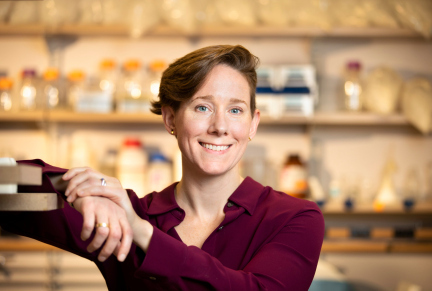September 2020 - Dr. Kathryn B.H. Clancy
Dr. Kate Clancy is a biological anthropologist, human reproductive ecologist, and intersectional feminist biologist who studies the relationship between environmental stressors and the reproductive systems of women and gender minorities. Her research focuses on endometrial function, reproductive justice, as well as sexual, gender, and racial harassment in the sciences. In addition to her appointment in the Department of Anthropology, Dr. Clancy is also affiliated with the Women & Gender in Global Perspectives Program, the Program for Ecology, Evolution, and Conservation, and the Beckman Center for Advanced Science and Technology. Dr. Clancy is also the host of the "Period." podcast, which you can find on Apple Podcasts, Spotify, or her website.
Explore our digital exhibit about Dr. Clancy, concerns over reproductive justice at the University of Illinois, and efforts to support more women scientists.
Reproductive Justice
Dr. Kate Clancy researches reproductive justice and prioritizes an intersectional feminist approach to studying science. From its founding in 1980, the Women in Development program collected publications about women, gender, reproduction, development, and other related topics. This newsletter illustrates the concern students had about the use of science—particularly, environmental data and discussions of overpopulation—to attempt to curtail women's reproductive freedom.
Dr. Kate Clancy - In the News
"[Psychologically, sexually, and physically abusive] working conditions can have devastating effects on the health and well-being of those who are targeted and those who witness the abuse, Clancy said. They also force students to choose between their career goals and their desire to speak up for themselves or others" in "Team reports on abuse of students doing anthropological fieldwork" by Diana Yates, University of Illinois at Urbana-Champaign News Bureau, April 15, 2013. Full story available here or in Record Series 39/1/11, "Faculty and Staff Press Release File, 1951-" at the University of Illinois Archives.
"Kathryn Clancy, a professor of anthropology, was honored with the Distinguished Award for Excellence in Public Engagement for her contributions to promote inclusivity within the scientific community.Clancy’s public work has been highly influential in creating awareness of sexual harassment and gender discrimination in the workplace. She was a co-author of the National Academy of Sciences report on sexual harassment, which helped define a new era in how academic institutions respond to sexual harassment. Some significant ripple effects of her work include legislative bills, congressional briefings on legislative mechanisms to address sexual harassment, and continued journalistic and professional attention on the issue of harassment in academia." in "Awards recognize excellence in public engagement" by Katie Watson, University of Illinois at Urbana-Champaign News Bureau, July 10, 2020. Full story available here.
Gender Discrimination in the Sciences
In 1993, the Gender Program of the Consultative Gorup on International Agricultural Research (CGIAR) released a report illustrating some reasons why recruitment of women to scientific positions in international agencies had been largely unsuccessful. The report suggests that the low percentage of qualified women with Ph.D.'s is a likely reason for their low representation, although it also finds that "the 'old boy' network for mobilizing candidates continues to work most effectively at [the management level], particularly within the scientific community" (page 12). Dr. Clancy's research investigates other means of gender discrimination and harassment that prevent women and gender minorities from being represented in the sciences.


